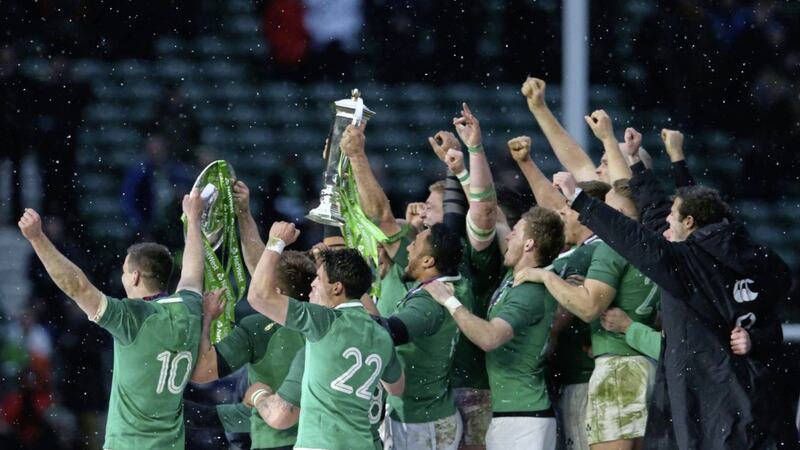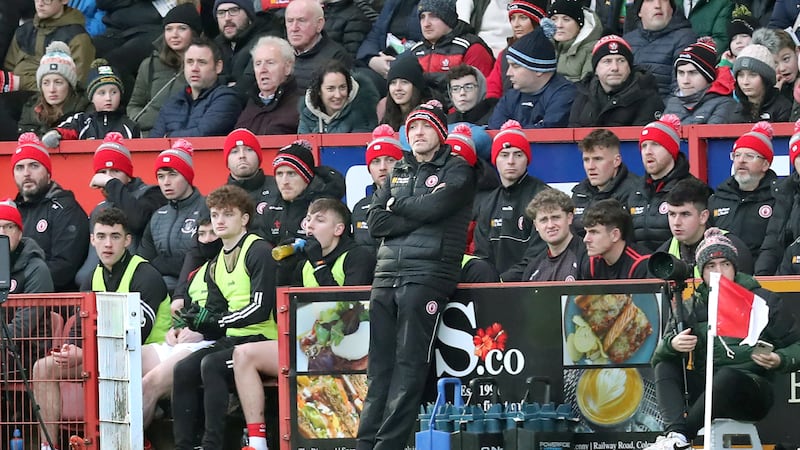EVERY sports fan lives for days like Saturday.
Drop the children off, head to the bar and settle into a groove just in time for kick-off in Swansea v Tottenham.
Watch two-thirds of that and then flick over to the club finals. Decide at half-time that Corofin are just so unbelievably good that even if they decided to send their under-16s out for the second half, Nemo still wouldn’t come back to win.
No need to channel hop from there. An occasional glance at Twitter for an update on the margin from Croke Park will do. It’s a free run at The Rugby.
Two full hours of unabashed patriotism follow. If you don’t already own a replica Ireland rugby jersey (two sizes smaller than the rest of your clothes, for gun effect), are you even Irish?
There are people draped in tricolours. Every second tweet on your timeline contains a message of good luck, adorned with either a flag or a shamrock emoji.
Our favourite national sport, Beating The English, is half the allure.
Borrowed talk will get you through most conversations because the reality is that, other than The Rugby Buff, everyone knows as little as each other.
Those not completely au fait with the rules of The Rugby wait for The Rugby Buff’s word before engaging in the more intricate conversations during the game.
Take Jacob Stockdale’s try for example.
Ordinary Punter (OP): “Ah sure he knocked it on, that’s an English penalty.”
The Rugby Buff (TRB): “I think it came off his knee.”
OP: “You’re right, it did. Just a scrum then?”
TRB: “It’s not a knock on if it hits his knee.”
OP: “Aw aye, I forgot that…”
TRB: [exasperated silence]
OP: [Turning to his equally clueless friend on the other side] “… But it’s not a knock on if it comes off his knee, see.”
Soon the whole bar is educated and by the time the TMO has drank his tea, eaten three Chocolate Digestives, put on his glasses and then finally taken a look, everyone’s ready to celebrate a score they initially had no idea had happened.
Watching the Irish rugby team is a great social event. Saturday was a national occasion that, no matter your sporting persuasion, you would have found it hard not to be drawn to.
You will find it hard not to remember where you were when Stockdale made a glorious fool of Mike Brown, as you will for Ronan O’Gara’s drop goal in 2009.
We all, every one of us, loved being up at 9am on a Saturday to watch Ireland beat Australia in the 2011 World Cup, just as we loved being up at 7am to see Matt Holland lash in that equaliser against Cameroon in 2002.
We loved emptying from schools and offices and building sites (and the bars, for some) to fill the streets in the middle of a working day when Robbie Keane scored against Germany, or hugging random strangers when Robbie Brady headed home against Italy.
Way back when, we loved Packie Bonner’s save, Barry McGuigan winning the world title, watching Sonia O’Sullivan or Alex Higgins do their thing.
If they’re Irish and their name isn’t Conor McGregor, chances are the whole nation will be undivided in their support.
When there’s something to latch to, boy do we latch.
But it’s a day here and a day there, and that’s all it really is.
Rugby comes and goes very quickly for the majority. Six weeks in Spring, three in November, and then a World Cup every four years.
Soccer captures the imagination on the nights of a big qualifier or in those major tournaments, but as a sport to engage with in this country, there are still more crossing the Irish Sea every week than watching the local leagues.
In the event of a cross-code clash, even the most hardened GAA people will strongly consider the national interest above most games of Gaelic football and hurling.
For example, when Ireland met France in their Euro2016 second round tie, the crowd at that afternoon’s Dublin-Meath clash was 42,259 – the smallest attendance at a game between the Leinster rivals since the early 1980s.
The club finals at the weekend saw a decade-long run of 30,000 or so halved to 15,556. Repeated long-term, that would potentially damage the GAA.
But the GAA can sleep safe.
Ireland’s latest and greatest rugby success is lauded and will dominate headlines for a few weeks, but the problem rugby has now is the void.
The news that TV3 will next year bring the Champions Cup back to free-to-air TV for the first time in over a decade is a boost for the sport in the battle to capture the average heart and mind but for now, there is nothing.
Ireland’s summer tour in Australia might as well not exist. It’s behind the paywall on Sky and so public engagement will be at a premium.
It will have zero impact on the two big hurling games on June 9 (Galway v Dublin, Kilkenny v Wexford) or the Munster football final on June 23.
The Irish soccer team will have a quiet six months after failing to qualify for the World Cup, and their one worthwhile friendly against France is on a Monday night.
And the GAA? They’ll go on dominating the back pages, week after week. They’ll provide the summer’s thrill and spill, every Saturday and Sunday, for almost four months.
That’s after having offered it through the National Leagues (*weather dependent) for the early part of the year. And with the public’s hearts and minds engaged, the club championships will kick in in August and run on until December.
The stars of the big screen will become the stars of the small field, and the nation’s young sporting enthusiasts will continue to be drawn to that element.
On RTÉ’s weekly rugby show ‘Against the Head’, the panel recently debated whether rugby was now ‘the people’s game’.
Apart from the fact that rugby is not listed among the top 15 sports in Ireland in terms of participation levels (2015 ESRI report), the most interesting comment was that everyone in society would have an opinion on Ireland’s Grand Slam chase, but they might not have an opinion on an All-Ireland final.
The 1.14million that watched last year’s football final on TV, or the 916,000 that watched the hurling decider, and the 164,000 on top of that who went to the games, would suggest otherwise.
While the Grand Slam will always be remembered and celebrated, it won’t change the fact that this is GAA country.







